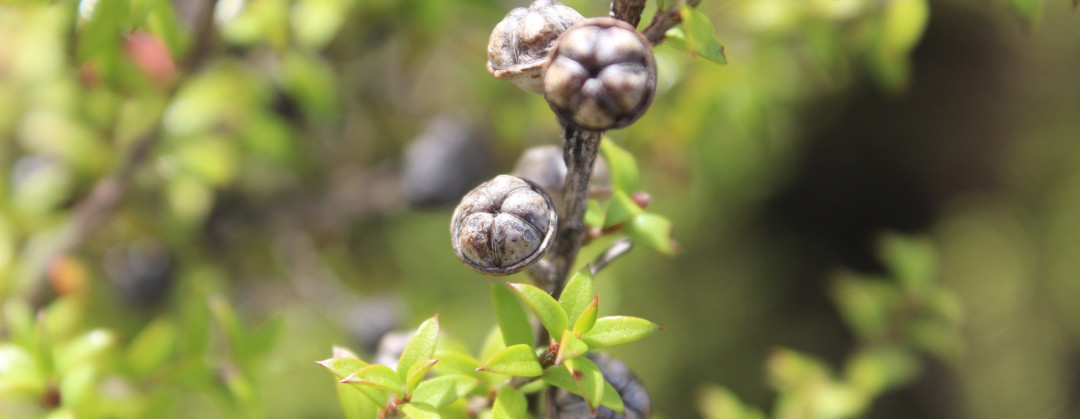Kātoa, rauiri, pata, rauwiri, kahikātoa.
Leptospermum scoparium Mānuka

This guide is based on a literature review. It compiles information from various sources. Different sources may offer varying advice and findings.
Inconsistency around reported germination rates. No information available on seed viability. Can be grown from cuttings.
Moderate.
Seeds store well. Seed stored under dry conditions for 5 months germinated within 10 days.(1)
Can be propagated by cuttings (65-76% of rooting).(7) Germination is reduced in the dark.(3),(6) Higher germination in mid-winter and early spring.(2) Can be propagated in vitro.(8) Best results reported with semi-hardwood and hardwood cuttings taken between March-May and with hormone treatment.(1) Heat treatments did not benefit germination.(5)
Germination, seed storage, and vegetative propagation needs further investigation.
Information about the native seed profiles
All species names are in the following order: scientific name, common name, and Māori name. Names may vary by region. We have tried to use the most common names across New Zealand.
We have sourced photos from different websites and creators. We have used the images under different licences. These include Public Domain and Creative Commons licenses. For Leptospermum scoparium, the image details are:
-
Photo by (c) Joe Dillon – some rights reserved (CC BY)
- Original image
The basis for each seed profile is a literature review carried out by Scion. Te Uru Rākau – New Zealand Forest Service commissioned and worked on the review to produce a native seed catalogue. The full seed catalogue is on the Ministry for Primary Industries (MPI) website.
Metcalf, L J (1995) The propagation of New Zealand native plants. Godwit; Auckland, New Zealand.
Mohan, E; Mitchell, N; Lovell, P (1984) Seasonal variation in seedfall and germination of Leptospermum scoparium (manuka). New Zealand Journal of Botany 22, 103–107.
Mohan, E; Mitchell, N; Lovell, P (1984) Environmental factors controlling germination of Leptospermum scoparium (manuka). New Zealand Journal of Botany 22, 95–101.
Bannister P; Jameson P E (1991) Germination physiology of seeds from New Zealand native plants. Seed Symposium 9–15.
Battersby, P F; Wilmshurst, J M; Curran, T J; Perry, G L W (2017) Does heating stimulate germination in Leptospermum scoparium (Manuka; Myrtaceae)? New Zealand Journal of Botany 55(4), 452–465.
Mackay, A C; McGill, C R; Fountain, D W; Southward, R C (2002) Seed dormancy and germination of a panel of New Zealand plants suitable for re-vegetation. New Zealand Journal of Botany 40(3) 373–382.
Darby, I D; Hosseini Bai, S; Wallace, H M; Trueman, S J (2021) Adventitious rooting of cuttings from the therapeutic honey plants, Leptospermum polygalifolium and L. scoparium. Rhizosphere, 17, 100306.
Darby, I D; Wiegand, A; Hosseini Bai, S; Wallace, H. M; Trueman, S J (2022) Synthetic seed propagation of the therapeutic-honey plants Leptospermum polygalifolium and L. scoparium (Myrtaceae). Australian Journal of Botany 70, 447–454.